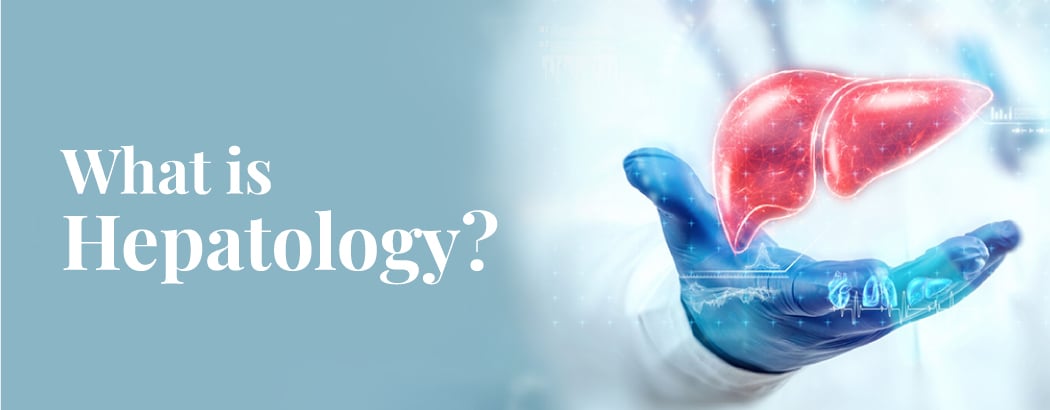What is Hepatology?
December 18, 2022

What is Hepatology?
Studying, preventing, diagnosing, and treating conditions affecting the liver, gallbladder, biliary tree, and pancreas is the focus of the medical specialty known as hepatology.
Contents
Origin of Hepatology
Hepatology was once thought to be a subspecialty of gastroenterology, but it is now a recognized field of study for physicians and is rapidly becoming a stand-alone specialty. The Greek words “hepatikos” and “logia,” which signify liver and study, respectively, are the origin of the word “hepatology”.
Hepatology
The field of medicine known as hepatology is dedicated to treating liver disorders and associated diseases, which include issues that affect organs of the hepatic system. Hepatology’s principal organs include:
- Liver: The liver is the main focus of hepatology.
- Pancreas: When the pancreas is seriously inflamed due to damage from the digestive enzymes, it can develop acute or chronic pancreatitis. This can also occur when a stone obstructs the release of the digestive enzymes produced by the pancreas or liver.
- Gallbladder: Bile imbalances can lead to the formation of gallstones, which obstruct the flow of bile.
- Biliary Tract
Diseases under Hepatology
The largest organ in the body, the liver, is the subject of hepatology. The liver performs a variety of vital functions for the body, such as converting food into energy, producing bile to aid in food digestion, and eliminating toxins. Even though diseases, binge drinking, and obesity can harm your liver, it is a strong organ that can recover with the right care. On the other hand, if liver damage is left untreated, it can eventually result in cirrhosis, scarring, and liver failure.
The diseases and complications that would fall under hepatology are:
- Viral Hepatitis, including Hepatitis B and Hepatitis C – Both of these liver diseases which are brought on by the hepatitis B and C viruses can result in cirrhosis and liver cancer if the infection persists for a long time.
- Autoimmune Liver Diseases – These inflammatory conditions, which can lead to cirrhosis and liver failure, are brought on by immune cells targeting the liver.
- Primary biliary cholangitis – Damage to the liver’s bile ducts can result in cirrhosis and liver tissue scarring.
- Primary sclerosing cholangitis – A bile duct condition where persistent inflammation and scarring can cause liver damage, liver failure, bile flow obstruction, and infections.
- Alcoholic liver disease (ALD) – The outcome of exceeding the liver’s capacity for processing alcohol, which harms the organ.
- Acute liver failure – A rapid loss of liver function.
- Non-alcoholic Fatty Liver Disease – Fat accumulation in the liver causes inflammation and scarring in individuals with metabolic disorders like diabetes and obesity.
- Wilson disease – A slow deterioration and scarring of the liver due to chronic injury.
Rare Diseases in Hepatology:
Some of the rarer diseases that come under hepatology are:
- Acute Hepatic Porphyria (AHP)
- Gilbert Syndrome.
- Hemochromatosis.
- Lysosomal Acid Lipase Deficiency (LALD)
- Wilson Disease
Symptoms of Hepatology Diseases
If you have particular symptoms, your doctor may recommend that you visit the hepatology department for further testing and diagnosis to rule out hepatological diseases. These signs could include:
- Skin and eyes that appear yellowish (jaundice)
- Abdominal pain and swelling
- Swelling in the legs and ankles
- Itchy skin
- Dark urine color
- Pale stool color
- Chronic fatigue
- Nausea or vomiting
- Loss of appetite
- Tendency to bruise easily
Hepatology Scan
A hepatology or a liver scan is a specialized radiology procedure that looks at the liver to evaluate its function or identify specific conditions. Additionally, a hepatology scan can be used to monitor how well some conditions are being treated.
Hepatology Procedures
The following crucial hepatology procedures are used to treat the various hepatic system disorders:
- Endoscopic retrograde cholangiopancreatography (ERCP), which is used to diagnose and treat many biliary and pancreatic diseases.
- Transhepatic pancreato-cholangiography (TPC), which is a form of X-ray imaging that is used to detect any obstructions present in the bile ducts or liver.
- Trans jugular intrahepatic portosystemic shunt (TIPSS), which is an artificial channel that is made to create a connection between the portal and hepatic veins.
- Liver transplant and pancreas transplant.
Doctor of Hepatology
A doctor who treats hepatological diseases is known as hepatologist. A liver specialist is another term for hepatologists. These medical professionals are qualified to identify, handle, and cure ailments of the pancreas, liver, gallbladder, and bile ducts.
Hepatology and Gastroenterology Connection
Hepatology and gastroenterology are related because they both deal with the gastrointestinal (GI) tract. In the GI tract, the liver, pancreas, and gallbladder are included, just like in the hepatic system. Given that they treat some of the same organs, hepatology and gastroenterology are sometimes regarded as related fields.
Conclusion
The frequency of hepatic system diseases is rising as well, which makes hepatology an even more important specialty for many people with hepatic conditions. The chances of a better outcome increase with prompt diagnosis and treatment.
Frequently Asked Questions
1. Why would I be referred to hepatology?
If your doctor suspects you may be having a problem with your liver, or it is not functioning as it should be, they may refer you on to a specialist called a hepatologist.
2. Is hepatology serious?
The frequency of hepatic system diseases is rising as well, which highlights the importance of the hepatology specialty to those with hepatic conditions. The good news is that most diseases that fall under hepatology are treatable and can be cured.
3. Is hepatology the same as gastroenterology?
Given that they treat some of the same organs, hepatology and gastroenterology are sometimes regarded as related fields. Gastroenterology can help diagnose and treat similar conditions, but hepatology’s focus is narrower.








